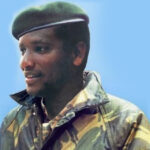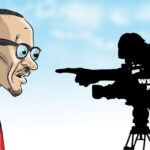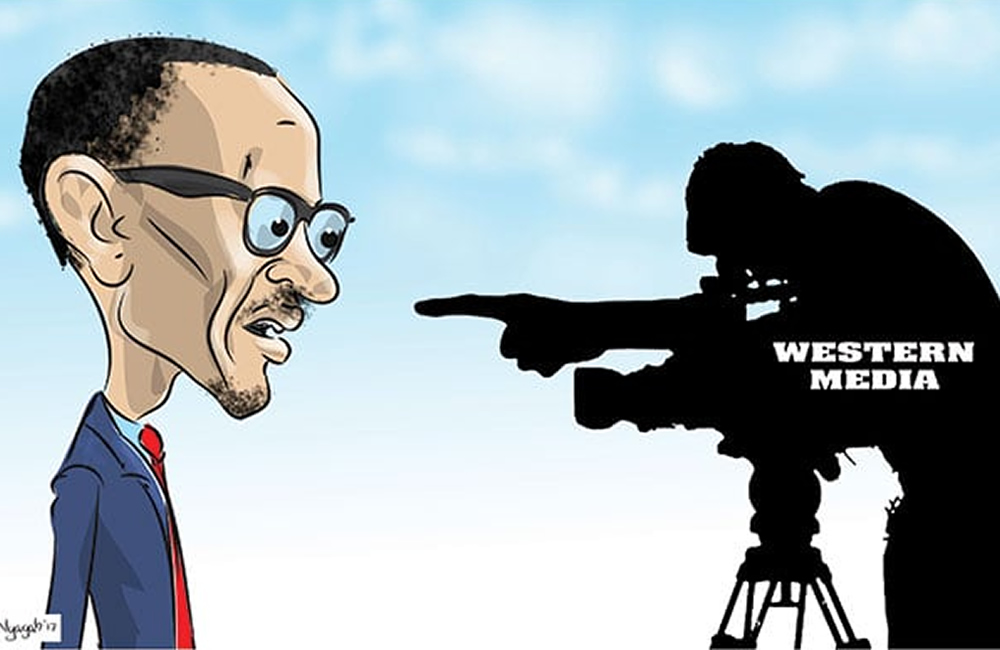Africans have for long been subjected to the thinking that prosperity and stability can only be achieved through western prescriptions. Trying other approaches like Rwanda has done, means being labeled rebellious and inviting trouble.
But as John Micklethwait and Adrian Woodridge discuss in their book, The Fourth Revolution: The Global Race to Reinvent the State, the western model is broken and unworkable, and as such, has lost the power to shape the world in its own image. Despite the reality that every society is capable of evolving on its own as the west did, western media is deployed to demonize bad students who try to challenge the prescribed order that every society must evolve according to the dictates of Western thinking. Rwanda and Kagame have broken the golden rule.
The race for the Rwandan presidency had three contenders, and no sooner had they started their political campaigns across the country than the Western media and Human rights organizations started demonizing only one presidential candidate, now President elects Paul Kagame. The usual narrative of vicious, malicious allegations in Western media, aimed at the person of president Kagame was a deliberately planned and coordinated campaign in the hope of damaging Kagame in the presidential race. The timing of the release of unsubstantiated and recycled human rights abuse allegations during a campaign period was not new. Robert Bernstein, the founder and former chairman of Human rights watch has publicly denounced biased reports of HRW under its director Kenneth Roth, as serving political interest rather than human rights protection.
The director of Human Rights Watch (HRW) resorted to personal insults against President Kagame. One might have expected a director of a supposedly human rights organization to be sensitive to the distress caused to President Kagame’s family who has to endure such crude insults with him, which in itself is an infringement on their human rights. Western media aided the spread of such hate language, which is in complete violation of the role and ethical standards of the media and failure to exercise journalism of attachment and objectivity.
Biased western media coverage, “human rights” and “expert” reports demonizing President Kagame during an election time had three main objectives: first to influence the thinking of the Rwandan voters to see their leader as undemocratic and change their support for him, bias the international community to change their foreign policy and isolate, Kagame, and lastly, change the narrative about the Rwandan history of the genocide, by turning heroes into villains, victims into killers, while sympathizers of the genocidal government of Habyarimana, and even some perpetrators are depicted as victims. Rwandans are now used to the trends of attacks by sections of the western media, whenever the country stages a major event. In particular, in the run up to the genocide commemoration.
Despite clear denunciation from Rwandans for instance, one thing of the things in the western media narrative about the country that has stubbornly stuck is the reference to Rwanda’s government as “Tutsi” led, and referring to others leaders as Hutu so and so. Those who seek to fan the dying embers of division among Rwandans cannot be unaware that such divisions were the building blocks to genocide. One wonders what the reaction would be if for instance members of the Belgian government were referred as Walloon, or Flemish led. It would one suspects be rightly condemned, but, it is apparently acceptable, even apparently essential in the case of Rwanda, or any other African nation.
Western Media criticism of Kagame comes at a time when the whole world can testify to how Rwanda has been transformed from a divided and almost failed state, to a unified, prosperous nation was rebuilt and strengthened institutions function efficiently. Western media instead threw wild claims that the country is in a climate of fear, dictatorship and that Rwandans lack human rights. Ironically, the same media demonizing Kagame was totally absent in 1994, when Rwanda was burning and over a million innocent lives were lost. General Romeo Dallaire, the UN force commander of UNAMIR at the time of the genocide, said that had the international media covered the Rwandan tragedy, it would have made a difference to push international actors to do something. When the genocide was finished, that is when Western media “descended in Droves” to cover the plight of refugees in Goma camps and sparked an international response! Media analysts noted the lapse of western media to inform the world when millions were dying in Rwanda, but the eruption of Nyiragongo volcano in Goma in 2002, where less than 100 people died attracted an influx of western journalists! Rwandans are still waiting to see when Western media will gang up to pressure their governments to take action on hundreds of genocide suspects living in comfort in their countries.
The Western media’s agenda driven coverage of Rwandan elections was based on an old school of journalism theory which perceives the media as political ‘agenda setter’ capable of influencing what society and policy makers should think, in order to influence the outcome. Following this theory, the media is used in election periods to frame political issues, shape political attitudes and behavior. The tradition of Western media to influence electioneering is not a new phenomenon. The point of interest here is to know why western media influence on Rwanda election fail to make an impact in the same way it failed during the American presidential elections; where much reporting showed bias against President Donald Trump?
The answer can be found in three basic facts: that Western main stream media has lost credibility and direction both at home and abroad, as it has become greedy for profit and a political tool rather than upholding the cardinal values of standing for the truth, impartiality and pursuing the common good. Biased reporting by Western media on Africa is very well documented. The vocabulary of “fake news” is synonymous with western media new found ‘values’ which has sunk the image of western media even further to the extent that it has become almost irrelevant in political agenda setting. The 2016 Pew Research study shows that public trust in American main stream media is as low as 22 percent! The second reason why western media failed to influence the outcome of Rwanda elections is that Rwandans know what they want and what others want is not in their interest.
The third reason is that global advancement in information technology, and affordable internet connectivity has enabled citizen media or social media as commonly known, to change the way people receive and consume media content. Breaking news for example, is now more often carried by social media rather than main stream media. Every citizen with access to the internet on telephone or computer is a source of news and able to give views, rendering obsolete the monopoly of main stream media as the sole source of news and views. Those who followed Rwandans’ reaction on social media in defense of their president realized that this is where the battle ground was. For example, one tweep challenging the allegation that Rwandans are forced to go and vote for Kagame, asked who then forced the Rwandan Diaspora to go and vote for Kagame with an overwhelming 95.5%.? The Diaspora vote showed that the claim of dictatorship and forced voting traded in western media was a product of fake news to serve interest of Kagame’s detractors.
There was also the claim that in a real democracy Kagame cannot win with 98 percentage votes. I have been watching Kenya’s presidential elections and results show that Uhuru Kenyatta won in areas of Nyandarua, Nyeri, Kirinyaga, Muranga, Kiambu, Marakwet and Kericho with an average of 96 percent, while Raila Odinga won in the areas of Vihiga, Siaya, Kisumu and Homa Bay with an average of 97 percent.
These areas of Kenya when combined together are far larger than Rwanda and one wonders why President Kagame’s 98 percent win with the support of eight main political parties against two first time contenders in the political arena becomes an issue within sections of the western media. Rwanda has critics and naysayers, who are fewer in number than those who are happy and contented with their leadership. Western media narrative wants to influence the world to believe that the reverse is true. Rwanda may disagree with the west on its form of democracy, and the Rwandan people should be left free to determine their destiny.
Scientists for more than 70 years made the world believe that Pluto was one of the nine planets recognized in the solar system. However, in 2006, the International Astronomical Union (IAU) demoted Pluto to the status of dwarf planet. Similarly, western main stream media has faced self-demotion from the long acclaimed “fourth estate” position, since it has lost direction and principles of professional journalism. When western media ganged up to demonize Rwanda and President Kagame, not only Rwandans, exposed the biased lies, but also many global citizens and defenders of truth joined the conversation on social media from different parts of the world. “Rain beats a leopard’s skin, but does not wash out the spots”. African Proverb.



